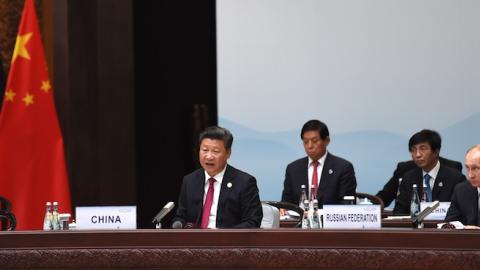President Obama has just returned from a disastrous G-20 summit — humiliated by his Chinese hosts, stared down by Russian president Vladimir Putin, traduced by Philippine president Rodrigo Duterte — and yesterday Iranian patrol boats were once again playing deadly games of chicken with U.S. naval vessels in the Persian Gulf.
Expect more of the same in the next 21 weeks: That’s how long Obama will still be in office. During that time Russia, China, and Iran will be watching the clock and will be tempted to make their most aggressive moves yet, knowing that his successor, whoever it is, is bound to be more forceful in protecting U.S. interests than Obama has been.
Indeed, virtually any president, including Jimmy Carter, would have been more assertive these past seven years. Obama, however, has been single-mindedly relinquishing or even undermining our position around the globe, as well as the position of our allies, including Israel and Great Britain. (Who else handed over secret data regarding Britain’s nuclear arsenal to the Russians?) At the same time, he’s given Russia, China, and Iran almost as much leeway as they could possibly want to advance their own agendas.
On January 20, however, that window of opportunity will start to close.
The temptation for the Moscow-Beijing-Tehran axis will be to establish on the ground a series of faits accomplis that Obama’s successor will be reluctant to try to reverse, especially if military force or the threat of military force would be needed to dislodge or displace their gains. America’s antagonists will also be counting on the fact that during these twenty-odd weeks Obama won’t want to wreck his legacy by precipitating a major international crisis, particularly one that puts Hillary’s electoral chances in danger.
So what can we expect?
First of all, both Russia and Iran already have started their moves toward the finish line. We’ve seen Putin pick a fresh fight with Ukraine, one that sets the stage for further possible incursions into Ukrainian territory, and we’ve seen Russian planes using Iranian air bases to launch strikes in Syria — an unprecedented step in Moscow–Tehran cooperation.
Meanwhile, China has stepped up its provocative moves in the East China Sea as well as South China Seas, while its catspaw North Korea has successfully launched its first ballistic missile from a submarine.
The next three months could bring a fresh Russian incursion into Ukraine or even into the Baltic states.
But things could get even uglier. The next three months could bring a fresh Russian incursion into Ukraine, perhaps, or even into the Baltic states. Asian experts are waiting for a unilateral Chinese declaration of an air-defense identification zone, or ADIZ, in the South China Sea similar to the one it’s imposed in the East China Sea. That would sharply restrict the air space around the highly contested Spratly Islands. Beijing knows that move would lead the Obama administration to post a public protest and to repeat its calls for peace and calm in the region but to do little else.
As for Iran, its next move could be sending Hezbollah or Hamas sophisticated missile systems with which to threaten Israel; it could step up its support for anti-Saudi guerrillas operating in Yemen. The worst-case scenario would be an Iran-sponsored terrorist attack on Saudi oil fields, in the hopes that a shutdown of Saudi oil production would drive up prices of crude oil so that Iran got a better premium on the oil it would be pumping as Western sanctions ended.
Is that scenario likely? Certainly it’s hard to know what outrages to expect, or when. Yet that’s exactly what seven years of living dangerously with Obama at the foreign-policy helm has been like anyway — from the vanishing “red line” in Syria and mayhem in Libya to the rise of ISIS and Russia’s annexation of Crimea.
The difference is that now, as we approach the end of his presidency, we can begin to see America’s foes gathering for one last shot before the buzzer rings — and before the game that they have dominated and manipulated since he took office finally comes to an end.















